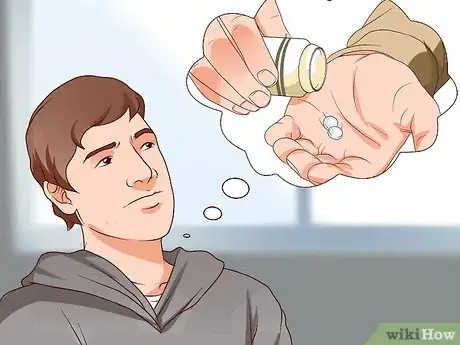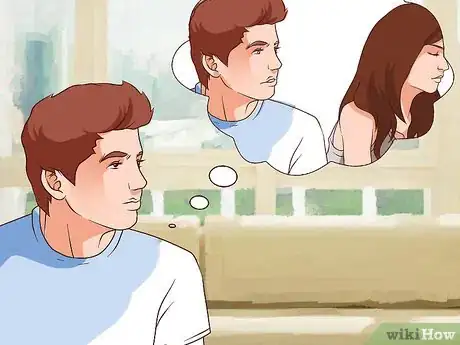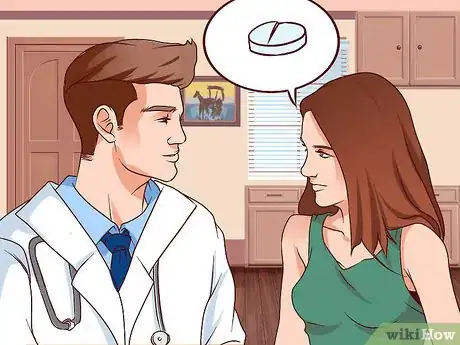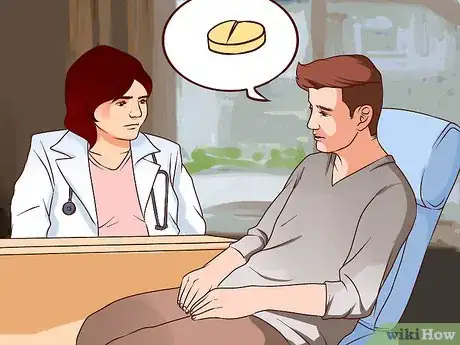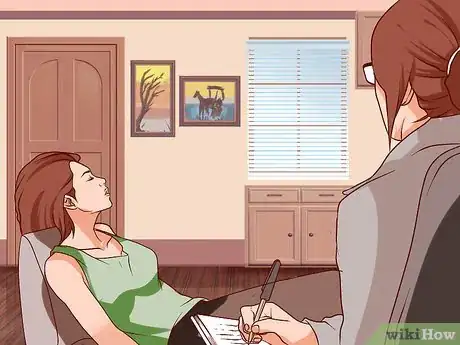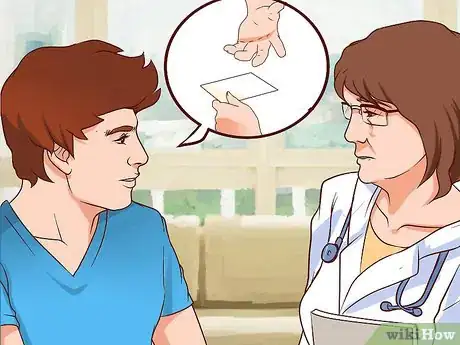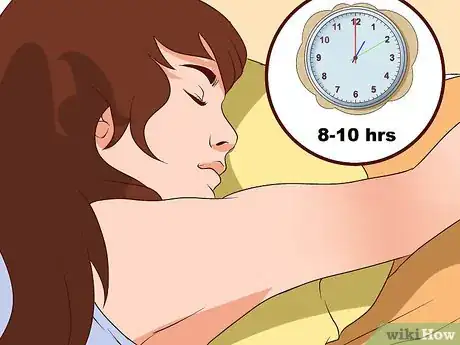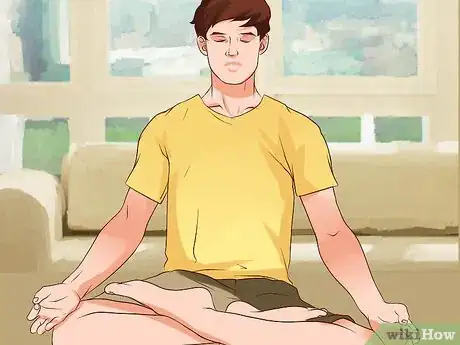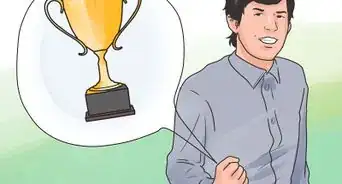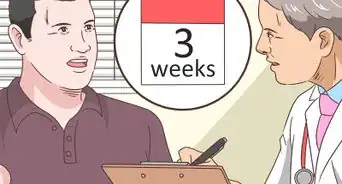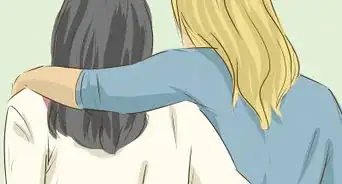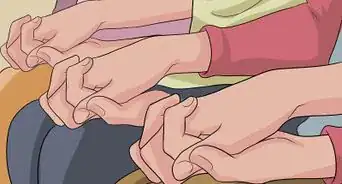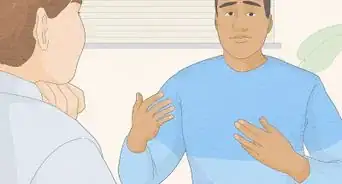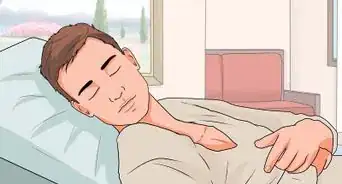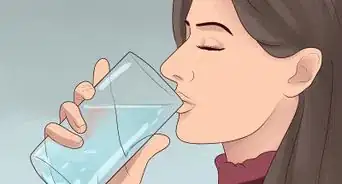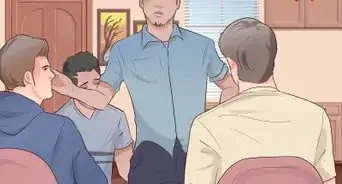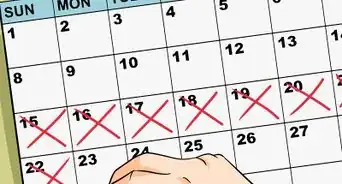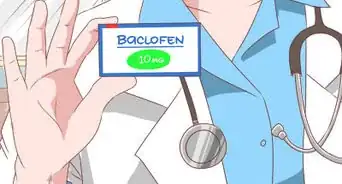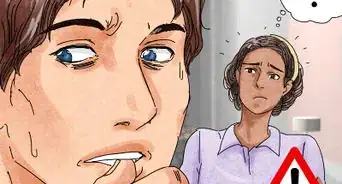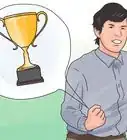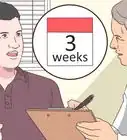This article was co-authored by Tiffany Douglass, MA. Tiffany Douglass is the Founder of Wellness Retreat Recovery Center, a JCAHO (Joint Commission on Accreditation of Healthcare Organizations) accredited drug and alcohol treatment program based in San Jose, California. She is also the Executive Director for Midland Tennessee at JourneyPure. She has over ten years of experience in substance abuse treatment and was appointed a Global Goodwill Ambassador in 2019 for her efforts in residential addiction treatment. Tiffany earned a BA in Psychology from Emory University in 2004 and an MA in Psychology with an emphasis on Organization Behavior and Program Evaluation from Claremont Graduate University in 2006.
There are 11 references cited in this article, which can be found at the bottom of the page.
wikiHow marks an article as reader-approved once it receives enough positive feedback. In this case, several readers have written to tell us that this article was helpful to them, earning it our reader-approved status.
This article has been viewed 59,608 times.
Amphetamines are stimulant drugs that include ADHD medications such as Adderall and Ritalin, medications used to treat narcolepsy, and the illegal drug Methamphetamine (“meth,” “speed,” “crystal meth”). Amphetamine use is prevalent, with approximately 25 million people taking amphetamines across the globe.[1] Amphetamines may also be the most abused prescription drug. Amphetamines are highly addictive, so they can be challenging to quit once your body has become dependent on them. If you are focused and committed to overcoming your amphetamine use, you may benefit from: evaluating your use, getting professional help, knowing how to deal with withdrawal symptoms, and using skills to promote long-term recovery.
Steps
Recognizing Your Amphetamine Use
-
1Assess your amphetamine use honestly. It can be hard to admit that your drug use is out of control, but be honest with yourself about how much you are taking and how frequently you are using it. This may help you to realistically view your issue and can help motivate you toward positive change and create goals for yourself.
- Ask yourself: How much time are you devoting to your habit? How much money are you spending to support your habit?
- Focus on accepting the reality that you may be spending a lot of time and money using amphetamines. The more you accept it, the more likely you will be motivated toward positive change.[2] This is perhaps due to the idea that acceptance helps us admit and own our weaknesses, which is necessary to modify our behaviors.
-
2Evaluate the impact of your amphetamine use on your life. Again, this can be difficult to do honestly, but try to think about how your amphetamine use has affected your life. For example, did you know that amphetamine use can cause all sorts of negative consequences such as impaired attention, memory, decision-making, impulse control, planning and learning?[3] In some cases, excessive amphetamine use can lead to paranoia and psychosis. Identifying these negative consequences can help motivate you toward positive change.
- Ask yourself: Have you lost friends or let important relationships suffer? Have you been performing poorly at school or work? Is your health suffering as a result of your amphetamine use? Is your habit likely to cause legal problems (or has it already)?
Advertisement -
3Acknowledge your problem. It may be challenging to admit that you have a problem. Individuals commonly think they are in control and that they “can stop at any time.” The first step to getting better, though, is admitting that you have a problem.[4]
- You may have an Amphetamine Use Disorder are if you are: taking amphetamines in larger amounts or for longer periods of time than you intended, wanting to reduce your use but not being able to, spending a lot of time or energy getting/using/recovering from amphetamines, and craving amphetamines.
- Tolerance is another symptom of Amphetamine Use Disorder. This means you are tolerating higher amounts of amphetamines over time and needing more in order to get the same effect.
- Another symptom of Amphetamine Use Disorder is if you experience symptoms of withdrawal (you experience unpleasant mental and physical side effects when you stop taking the drug).
- Additionally, if you are not able to complete work or home obligations due to amphetamine use, or you are having relationship problems due to your use, you may have a substance use disorder.
- Have compassion for yourself and accept that you have a problem. Having self-compassion and thinking about your weaknesses can actually motivate you to make changes.[5]
Getting Professional Help
-
1Talk to a medical doctor. Amphetamine use should be treated like a medical condition or illness.[6] If at all possible, see a doctor to discuss your amphetamine use and talk about how best to overcome it. A medical doctor can help you decide which method is best for you. A doctor can also recommend treatment centers and other resources.
- If you do not currently have a physician, contact your medical insurance company to find one. If you do not have medical insurance you can find a free or low-cost clinic in your area. Also, check with your local government for medical services or benefits for low-income families.
- If you are prescribed amphetamines by your medical doctor or psychiatrist, discuss your issue with the doctor who prescribed it.
- If you are using methamphetamine, an illegal substance, you can usually discuss this openly with your doctor without fear of legal issues due to doctor-patient-confidentiality laws. Make sure you ask the doctor about the limits of confidentiality (if you are a danger to yourself or others).
-
2Explore medication options for the reduction of amphetamine use. Medications such as Naltrexone (Vivitrol), and Bupropion (Wellbutrin) have been implicated in the treatment and reduction of amphetamine use.[7]
- Consult with your primary care doctor or psychiatrist.
-
3Get psychological treatment. Treatment options such as Cognitive Behavioral Therapy (CBT) help to reduce or eliminate amphetamine use.[8] CBT is a therapy modality that focuses on changing your thinking in order to change your feelings and behaviors.
- Speak to a clinical psychologist (PsyD, PhD), marriage and family therapist (MFT), or other licensed clinician. You can typically get contact information for therapists via your medical insurance company.
-
4Consider different options for recovery. You’ll have two major options for eliminating your amphetamine use: you’ll either tapper down under the direction of a doctor, or seek a detox program[9] . It is not recommended that you quit all at once (cold turkey). Whatever you chose, you will need to have a plan or a treatment program in place to support your recovery.
- Think about the possibility of a detoxification program - an inpatient unit where therapist and medical professionals can evaluate you closely through the process of detoxification. Rehabilitation and detox treatment centers can be the best places to detoxify your system, but these solutions are not for everyone as they can be costly.
- Consider looking for a support group in your area. These groups often meet at community centers and other locations to talk and offer mutual support. Find out what is available before you start detoxing, so that you’ll have a plan in place once things get tough.
Getting Through the Initial Withdrawal
-
1Take control of your environment. When you stop taking amphetamines, you may experience withdrawal symptoms and strong cravings for the drug.[10] Prepare for these issues in advance by preparing a safe environment for detoxification. Ideally, you want to stay someplace where amphetamines are not available, where you cannot access the drug easily, and where you are unlikely to encounter any friends or relatives who use the drug.
- Consider choosing a major change of scenery. If possible, go to a supportive friend’s or relative’s house, rather than staying at your own place. It can be easier to break the cycle of addiction if you are in unfamiliar surroundings.
- Consider going to a drug treatment facility or rehab program.
-
2Identify people who can help you. Know, in advance, who will support you when you have withdrawal symptoms or strong cravings. Professionals – doctors and therapists – fall into this category, as do members of support groups, close relatives, and good friends, as long as none of these people are using drugs.
- It may be helpful to make a list of all of the people you can contact during your detox. Make sure you have emergency phone numbers available, as well as doctor’s contact information, and your closest hospital address.
-
3Anticipate and prepare for the symptoms of withdrawal. As your body adjusts to the absence of any amphetamine, you will begin to experience withdrawal symptoms, the most severe being within the first 24 hours. Then, the severity will typically taper off in about 2-3 weeks. Common withdrawal symptoms include: increased sleeping and eating, depressed mood, concentration issues, irritability, feelings of anxiety, fatigue, vivid or unpleasant dreams, and cravings.[11]
- Expect these withdrawal symptoms, and try to spin them in as positive a light as you can by thinking thoughts such as, “This is my body getting clean; these are the obstacles I have to face to get to the other side. I am strong enough to get through it.”
-
4Consider medication for withdrawal symptoms. If you are working with a physician or treatment center, ask about medications to help you manage your withdrawal symptoms. These medications may not completely eliminate the withdrawal symptoms, but they can reduce them. One medication that may help to reduce amphetamine withdrawal symptoms is Reboxetine (Edronax).[12]
- If you are prescribed medication, take it as scheduled, and follow up regularly with your doctor.
-
5Stick to a daily routine. Having structure to your day and keeping busy can help you manage withdrawal symptoms. The less time you sit around thinking about amphetamines and focusing on how terrible withdrawal feels, the better.
- Eat and sleep on a regular schedule. Make sure you are eating healthfully (plenty of fruits, vegetables, and protein). Sleep at least 8 hours per day, but try not to sleep more than 10 hours.
- Have a plan to fill the other hours, too. Make a to-do-list or a schedule for your day. Take this time to complete tasks that you normally don't get to (cleaning out a closet or sending emails you've been avoiding).
-
6Cope with your cravings. During the initial withdrawal period, you may experience very strong drug cravings. Develop coping mechanisms to reduce the likelihood of giving in.
- If your craving is very strong and you fear you might give in, try telling yourself to wait just an hour. Then try for another. Breaking up withdrawal into shorter, more manageable periods of time may help you cope. Be strong, and know that it will get easier with time.
- Distract yourself, try to think about something else, and be proud of whatever self-control you can manage to exert.
- Try prayer or meditation. The initial withdrawal period can be very difficult. You might find that prayer or meditation helps you stay calm and feel stronger and more at peace.
-
7Focus on new habits. As the strong physical symptoms of withdrawal begin to subside, turn your energies to healthy habits.
- Try relaxing activities like reading and gardening.
- Engage in positive physical activities such as exercise and cooking.
- Focus on whatever activities keep you occupied without exposing you to people and places you associate with your amphetamine use.
Sustaining Your Success
-
1Continue to adhere to your daily routine. If a regular structure to your day helped you get through the initial withdrawal period, it may also help you conquer your addiction long-term. Adjust your schedule as necessary, but keep the good habits that you’ve developed already.
- Make sure you continue to manage any medications you are taking and have regular trips to your medical doctor.[13]
-
2Stick with your counseling program or support group. Don’t stop taking advantage of these resources just because you are feeling better. Recovery from addiction is a process, so continue to check in with your doctor, therapist, or support group. [14]
- If this begins to feel burdensome, try thinking of it like eating right or exercising. It’s something you do regularly to stay healthy, even when you’d rather not.
-
3Celebrate milestones. Thinking about the rest of your life can be overwhelming, so stop and celebrate your accomplishments periodically: two weeks clean, a month, three months, a year.
- After even a day or week sober you can treat yourself to something you enjoy like a nice dinner or a trip to the beach. Focus on what you have done well and take the time to set goals for the next week.
- After a month of sobriety you can celebrate by having a clean and sober party (with no alcohol, drugs).
-
4Surround yourself with the right people. Build healthy friendships and stronger personal relationships. Resist the urge to start spending time with the people with whom you used to use amphetamines.
- You can set specific boundaries with individuals who use amphetamines by saying something like, "I am focusing on my sobriety and am still in the early stages of recovery, so I can't be around people who use right now. It is too risky for me and I hope you will understand that."
- Cultivate new relationships with individuals who do not use alcohol or drugs or any kind. Try signing up for a gym, dance class, church group, or any other social activity.
-
5Watch for warning signs. If you notice increased cravings, feelings of hopelessness, or a lot of additional stress, you may be at risk for a relapse. During these times, it is especially important to avoid people, places, and situations you associate with amphetamine use. [15] Stay strong, and focus on what you’ve accomplished.
- If you do use amphetamines again and regret it, try not to beat yourself up – that won’t help. Remember that you stopped once; you can do it again. Get help immediately, and get back on track.
Expert Q&A
-
QuestionHow do I choose a rehabilitation facility?
 Tiffany Douglass, MATiffany Douglass is the Founder of Wellness Retreat Recovery Center, a JCAHO (Joint Commission on Accreditation of Healthcare Organizations) accredited drug and alcohol treatment program based in San Jose, California. She is also the Executive Director for Midland Tennessee at JourneyPure. She has over ten years of experience in substance abuse treatment and was appointed a Global Goodwill Ambassador in 2019 for her efforts in residential addiction treatment. Tiffany earned a BA in Psychology from Emory University in 2004 and an MA in Psychology with an emphasis on Organization Behavior and Program Evaluation from Claremont Graduate University in 2006.
Tiffany Douglass, MATiffany Douglass is the Founder of Wellness Retreat Recovery Center, a JCAHO (Joint Commission on Accreditation of Healthcare Organizations) accredited drug and alcohol treatment program based in San Jose, California. She is also the Executive Director for Midland Tennessee at JourneyPure. She has over ten years of experience in substance abuse treatment and was appointed a Global Goodwill Ambassador in 2019 for her efforts in residential addiction treatment. Tiffany earned a BA in Psychology from Emory University in 2004 and an MA in Psychology with an emphasis on Organization Behavior and Program Evaluation from Claremont Graduate University in 2006.
Founder, Wellness Retreat Recovery Center When you're researching addiction recovery options, make a list of several treatment centers that seem to fit your budget. Check whether each center takes your insurance, and understand how much it would cost for each of the treatment options available, like detox, inpatient treatment, or outpatient treatment. From there, you can decide on the treatment level you need based on where you're at in your addiction.
When you're researching addiction recovery options, make a list of several treatment centers that seem to fit your budget. Check whether each center takes your insurance, and understand how much it would cost for each of the treatment options available, like detox, inpatient treatment, or outpatient treatment. From there, you can decide on the treatment level you need based on where you're at in your addiction.
References
- ↑ https://www.unodc.org/documents/wdr/WDR_2008/WDR_2008_eng_web.pdf
- ↑ http://citeseerx.ist.psu.edu/viewdoc/download?doi=10.1.1.362.5856&rep=rep1&type=pdf
- ↑ http://www.ncbi.nlm.nih.gov/pmc/articles/PMC3639428/
- ↑ http://www.ajhpcontents.com/doi/abs/10.4278/0890-1171-12.1.38
- ↑ http://citeseerx.ist.psu.edu/viewdoc/download?doi=10.1.1.362.5856&rep=rep1&type=pdf
- ↑ http://citeseerx.ist.psu.edu/viewdoc/download?doi=10.1.1.462.8284&rep=rep1&type=pdf
- ↑ http://www.researchgate.net/profile/Helena_Vorma/publication/6597656_A_comparison_of_aripiprazole_methylphenidate_and_placebo_for_amphetamine_dependence/links/00b49526fef01351c5000000.pdf
- ↑ http://www.ncbi.nlm.nih.gov/pmc/articles/PMC2825894/
- ↑ http://www.health.gov.au/internet/publications/publishing.nsf/Content/drugtreat-pubs-modpsy-toc~drugtreat-pubs-modpsy-3~drugtreat-pubs-modpsy-3-7~drugtreat-pubs-modpsy-3-7-pws
- ↑ https://www.researchgate.net/publication/7631630_The_nature_time_course_and_severity_of_methamphetamine_withdrawal
- ↑ https://www.sahealth.sa.gov.au/wps/wcm/connect/public+content/sa+health+internet/clinical+resources/clinical+programs+and+practice+guidelines/substance+misuse+and+dependence/substance+withdrawal+management/amphetamine+withdrawal+management
- ↑ https://bpspubs.onlinelibrary.wiley.com/doi/full/10.1111/j.1365-2125.2004.02094.x
- ↑ http://citeseerx.ist.psu.edu/viewdoc/download?doi=10.1.1.462.8284&rep=rep1&type=pdf
- ↑ http://citeseerx.ist.psu.edu/viewdoc/download?doi=10.1.1.462.8284&rep=rep1&type=pdf
- ↑ http://citeseerx.ist.psu.edu/viewdoc/download?doi=10.1.1.462.8284&rep=rep1&type=pdf
